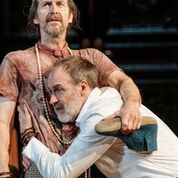Tartuffe - National Theatre
- Kathleen Bondar

- Mar 18, 2019
- 2 min read
Loosely aligned to the original C17 Tartuffe by Moliere, this production of Tartuffe from John Donelly and director Blanche McIntyre crashes headfirst into the twenty-first century with contemporary characters and homeless extras. The protagonist, Tartuffe played by Dennis O’Hare, is a new age, crusty - rather than a Catholic zealot. Ice cubes replace the hair shirt for self-flagellation. There are plenty of expletives and much sexual cavorting. The impressive set is oligarch bling; the play is located in C21 Highgate. The production is punctuated by sound system blasts and flashing lights.
By John Donnelly, directed by Blanche McIntyre. Denis O’Hare as Tartuffe, Kevin Doyle as Orgon. Lyttelton, National Theatre until 30 April 2019
The theme of hypocrisy - religious, sexual and wealth – underscores the play in the same vein as the original play. The daughter Marianne (Kitty Archer) is generation Z, vain and delightful, an independent young woman spending daddy’s money. Her public-school lover Valere (Geoffrey Lumb) fancies himself as a slam poet. Orgon’s adulterous second wife Elmire (Olivia Williams) is hell-bent on exposing Tartuffe’s sexual advances to prove her innocence. The patriarchal father Orgon (Kevin Doyle) is proudly self-made, except his dealings are underhand. And of course, Tartuffe is the ultimate hypocrite, a new age embezzler and Lothario. All characters are presented with gusto and skill by an excellent cast.
Moliere’s Tartuffe, also called The Impostor, however, dealt a more moral and political blow in ridiculing religious hypocrisy at a time when Christian fundamentalism was rife. Donelly’s version doesn’t deliver much in this respect.
Also, there are some curious anomalies in Donelly’s and McIntyre's efforts to update a seventeenth century French classic. Orgon is a feudal patriarch commanding his generation Z daughter to marry Tartuffe. Along with the rest of Orgon’s family, Marianne hurls twenty-first century arguments and insults back at him. Suddenly, there are two different conversations and parallel universes which don’t add up.
Similarly, whilst Tartuffe is a brazen impostor wielding spiritual power over his rich benefactor, he proffers an undefined, laughable spirituality which no one credits, not least Tartuffe himself. What we get is a medieval patriarch conversing with a new age joker. All these polarised conversations are even more compounded by a range of accents across cultures, continents and centuries. Tartuffe’s accent, in particular, is simply bewildering.
In the end, what these anomalies serve, is a great deal of endless and ever increasing farce as the family outdo each other in exposing Tartuffe's hypocrisy to Orgon. McIntyre and Donelly’s Tartuffe is nothing if not farcical, at times overstretched, at times hilarious.
Images: top left Enji Okoronkwo & Kitty Archer; top right Kevin Doyle & Kitty Archer; bottom left Denis O'Hare & Kevin Doyle; bottom right A Scene from Tartuffe images by Manuel Harlan
https://www.nationaltheatre.org.uk/shows/tartuffe








